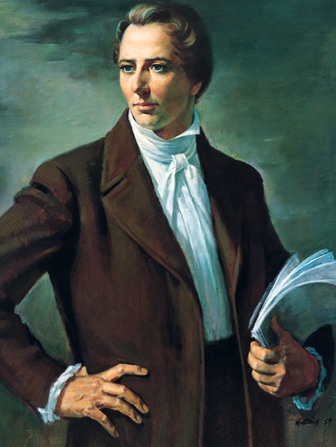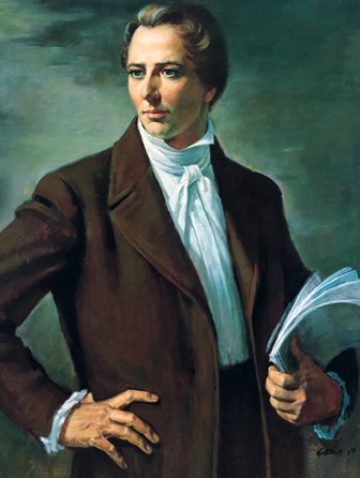What was Joseph Smith’s Role in the Restoration?
1) I would begin with a brainstorming activity to get the girls thinking about the different aspects of Joseph Smith’s ministry. What knowledge/power/organizations do we have today because of Joseph Smith? I’d push for as many specifics as possible and write on the board (answers might include events like the first vision, or principles, like the Word of Wisdom given in response to a question by Emma Smith)
To me, this is a good way of assessing their level of knowledge (and what might gaps you might usefully fill) as well as forcing them to think about what it might actually mean to “have a testimony of Joseph Smith.” Of what, specifically?
This might also be a good place to ask if the girls have any questions, which some might. Addressing things like polygamy honestly and openly, if they want to know, is to me the best policy. The lesson manual provides references that might help if the big issue in your class is ignorance of the basic facts about Joseph Smith. If your class seems unfamiliar, the time might most usefully be spent going over basics using these references.
2) I have found that having girls write is a good way to encourage introspection.We keep study journals for our girls in the YW closet, and I don’t ever read them. I want them to be able to participate actively, while also feeling safe.
Study the events/principles on the board. Pick ONE that you can honestly say that you have had an individual spiritual experience that confirms the truth of that aspect of Joseph Smith’s ministry. If you do not have one, consider other principles in the Gospel (such as the Atonement) that you do feel you can say have been confirmed to you spiritually. Write about your experience in your journal.
The goal here is to encourage them to examine their testimonies to see how deep they really are. Have they come to a personal belief, or do they believe out of habit? Above all, I want them to be assessing themselves, not me judging them.
I would share quotes from Elder Holland’s talk, for example this one:
“Jesus said, “If ye have faith as a grain of mustard seed, ye shall say unto this mountain, Remove hence to yonder place; and it shall remove; and nothing shall be impossible unto you.” The size of your faith or the degree of your knowledge is not the issue—it is the integrity you demonstrate toward the faith you do have and the truth you already know.
When problems come and questions arise, do not start your quest for faith by saying how much you do not have, leading as it were with your “unbelief.” That is like trying to stuff a turkey through the beak! Let me be clear on this point: I am not asking you to pretend to faith you do not have. I am asking you to be true to the faith you do have ”
3) Strategize. Open the floor to discussion in how we can develop a testimony of any one aspect of Joseph Smith’s ministry. Note how these principles can apply to gaining a testimony of anything in the Gospel. Encourage girls to share what they have written (if they feel comfortable) about how they have gained a testimony. How can you even tell if the Spirit is witnessing to you, if you don’t have a burning glorious moment? If personal experience is too difficult, encourage them to be creative and think of activities they could do that might help them have spiritual experiences.
Some possible ideas:
-Keep a note card or section of your journal and make an entry every time you have a good feeling or positive reaction about the principle in question. Often a testimony is an accumulation of tiny moments, not a miracle.
-Try what Joseph Smith did. You probably won’t see God, but in a peaceful place (inside and externally) you may well feel a closeness with God you can’t otherwise.
-Read Joseph Smith History and note any places where you feel you can relate to him
-Ask yourself how you would feel if X did not exist (the Book of Mormon, doctrine of Eternal Families, Temple trips, seminary, church programs, hymns of the church etc.) Prophets are known by their fruits. Are the fruits good in your life?
-Think in advance of a personal experience that you would feel comfortable sharing to get the ball rolling with vulnerability and being honest about life experiences.
This is only a tentative list, and I would want things to come mostly from the girls, not from me. The goal to me ultimately is to give them the tools to assess their own testimony, identify their doubts, and think about ways that they might find peace. I chose to break down Joseph Smith into his constituent elements (so to speak) because I want them to feel it is okay to have a partial testimony and be working on it. You can have a testimony of Joseph Smith, but not be totally sure yet about parts of it. It is not an all or nothing thing.
Share another quote from Elder Holland’s talk:
“I said I was speaking to the young. I still am. A 14-year-old boy recently said to me a little hesitantly, “Brother Holland, I can’t say yet that I know the Church is true, but I believe it is.” I hugged that boy until his eyes bulged out. I told him with all the fervor of my soul that belief is a precious word, an even more precious act, and he need never apologize for “only believing.” I told him that Christ Himself said, “Be not afraid, only believe,”12 a phrase which, by the way, carried young Gordon B. Hinckley into the mission field.13 I told this boy that belief was always the first step toward conviction and that the definitive articles of our collective faith forcefully reiterate the phrase “We believe.”14 And I told him how very proud I was of him for the honesty of his quest.”
4) Challenge of the week: Work on your testimony of one part of Joseph Smith’s ministry through one of the strategies we came up with. Pay close attention to your feelings.
This lesson plan was originally posted in 2013 as Young women lesson: What was Joseph Smith’s Role in the Restoration?
Author’s note: Here at Exponent II we have decided to start a new series similar to what we do with the Relief Society lessons. Twice a month bloggers will post a possible lesson plan to help teachers in the Young Women organization to prepare a lesson, as well as providing fodder for wider discussion. The new curriculum makes it unrealistic for us to attempt to provide a lesson plan for all possible choices, but we hope this will be a good jumping off place both for those who work with the Young Women and for those who would like to share thoughts and insights.
The topic of the lessons for this month is the Apostasy and the Restoration, and I have chosen to address the lesson about Joseph Smith. In truth I chose this as a challenge, because Joseph Smith has always been the part of the Gospel that I have struggled with the most. So when I heard Elder Holland’s talk in General Conference, it just seemed right to give it a try.






11 Responses
Em, I think that this series will be a valuable tool for women serving in the Young Women’s organization (as well as the young women themselves, and all else, in general). Thank you for creating this space.
Thank you further for your beautiful lesson outline. I really appreciate the way you explained your thought process and your hopes for the girls. It seems that the strength of your lesson–and the strength of the new lesson plans–is that the focus is on helping the youth to pay attention to the experiences that they are having, and to be the ones talking, and asking, and reflecting.
I really love this sentiment: “You can have a testimony of Joseph Smith, but not be totally sure yet about parts of it. It is not an all or nothing thing.” A lot of times in the gospel we are told that things are “all or nothing,” but that has never felt very true to my experience. Everyone’s testimonies are qualified. And that’s okay. That is what makes them honest. There may be some things that we can attach the word “know” too, but for everything else there is the still meaningful “believe,” or even “hope.”
THANK YOU!
Em,
Thank you so much for this! I am not in YW, but wish I would have had this lesson when I was a youth. I look forward to sharung this with the YW and leaders in my circle. Thank you!!
I taught this lesson yesterday and it went really well, at least one of my girls really needed it.
I had a stroke of inspiration right at the end and had the girls write down in their journals what their commitment for the week is. We have a chronic problem with girls not remembering their commitments and not following through because they forget. If everyone is doing the same thing I often have a presidency member text every girl to remind her but even then… So I’m thinking maybe at least they can look in their study journals to see what they were supposed to do. If anyone else is teaching YW, PLEASE share wisdom on how to do this challenge thing effectively.
We have an (unofficial of course) facebook page for the young women and I post reminders and links to videos or conference talks on there throughout the week. I force myself to wait in silence for them to remember what their assignment is and if they did it, it is easy for me to get uncomfortable with the silence but when I wait they realize that they need to speak up to fill the silence because I’m not just going to carry on without their input. These lessons are for them, not just for me to read everything to them and check it off, they are so used to being passive and being talked at instead of engaging themselves.
I love the idea of this series, Em! Thanks so much for putting it together.
I think another helpful tool is Laura Compton’s article in our latest issue of Exponent II(pg 22), “New Lessons, Old Language” where she outlines the implicit patriarchy in the new youth curriculum and where we can make things more equal.
Great lesson! I love how you have incorporated writing. We had a recent discussion about how to make church more accessible to introverts, and I think balancing more extroverted activities with writing activities could be one way to accomplish this. https://exponentii.org/an-introvert-in-the-church/
Hold a RS/YW combined activity, invite the nearly-RS aged girls to a few activities before they turn 18, find out their interests and include them in discussions, make friends with them.
I felt the same when I turned 18, because it seemed like nothing in RS applied to me. The ward I’m in now seems to have done a better job, because one recently turned 18 sister said that at the heart of it, RS is just like YW, just more opportunities to meet interesting people. 🙂
I would also say that it’s important to make references to experiences outside of motherhood or marriage. Yes, these are huge aspects of many of our lives, but not for all.
~Natasha
1love org
Thanks for this series!! This is such a valuable resource, I have been checking regularly for the May lesson to appear. I don’t feel comfortable teaching about Joseph Smith (fortunately I only teach on Fast Sunday), so I am teaching the lesson on personal revelation, but using the quotes and techniques you suggested Em. Thank you!